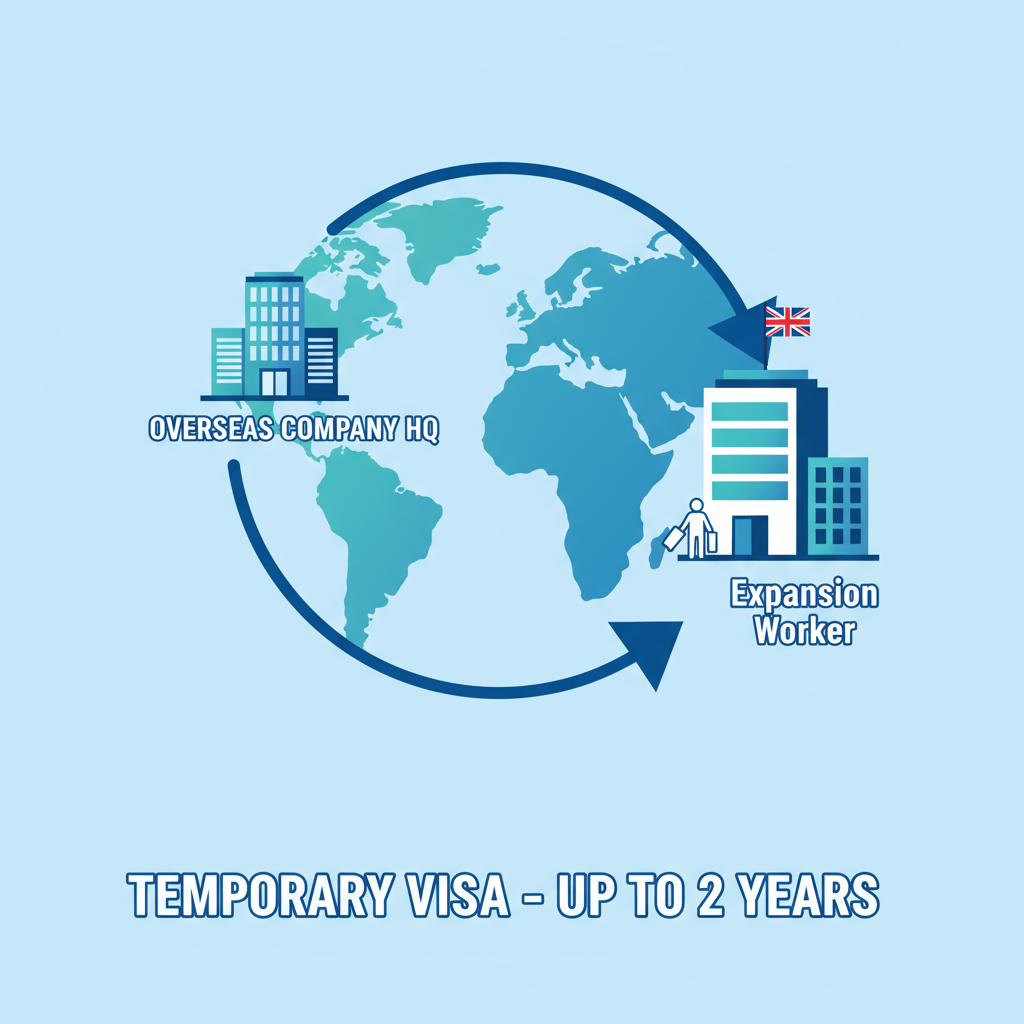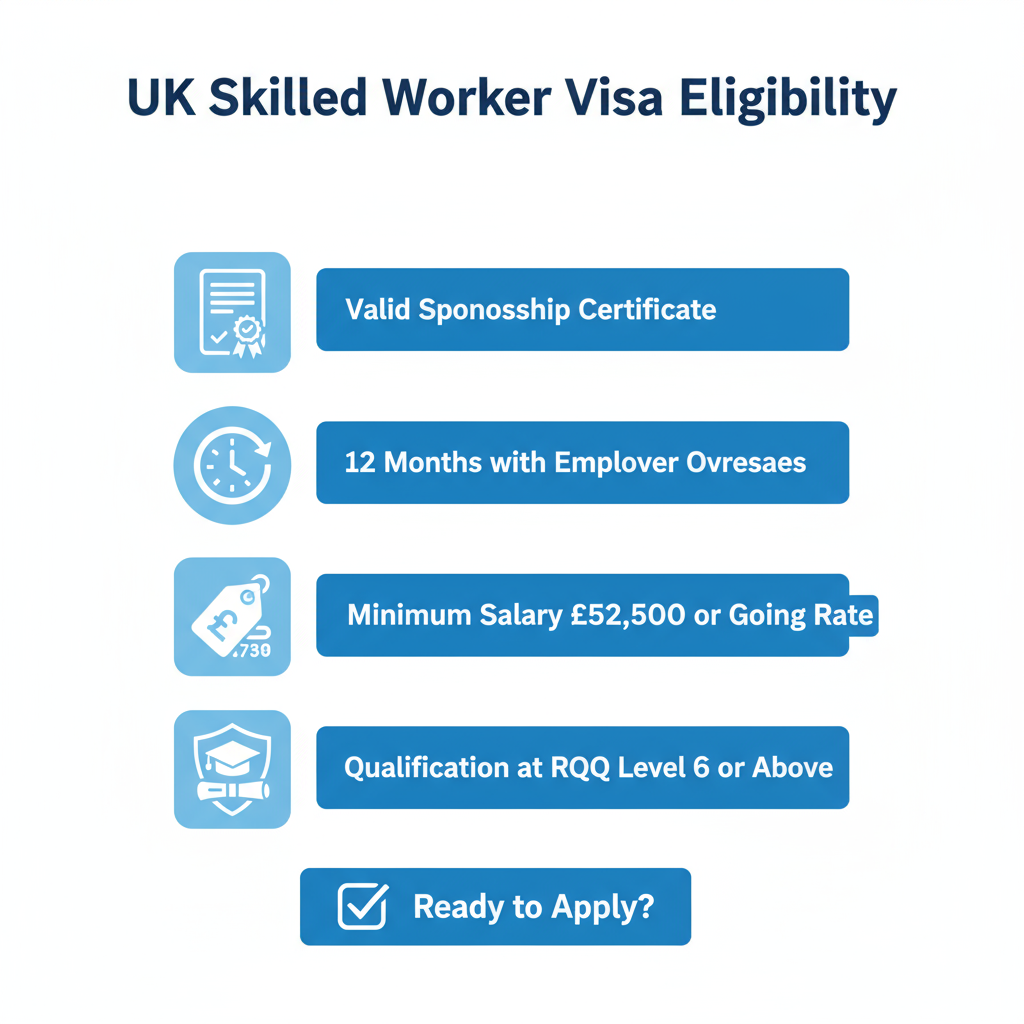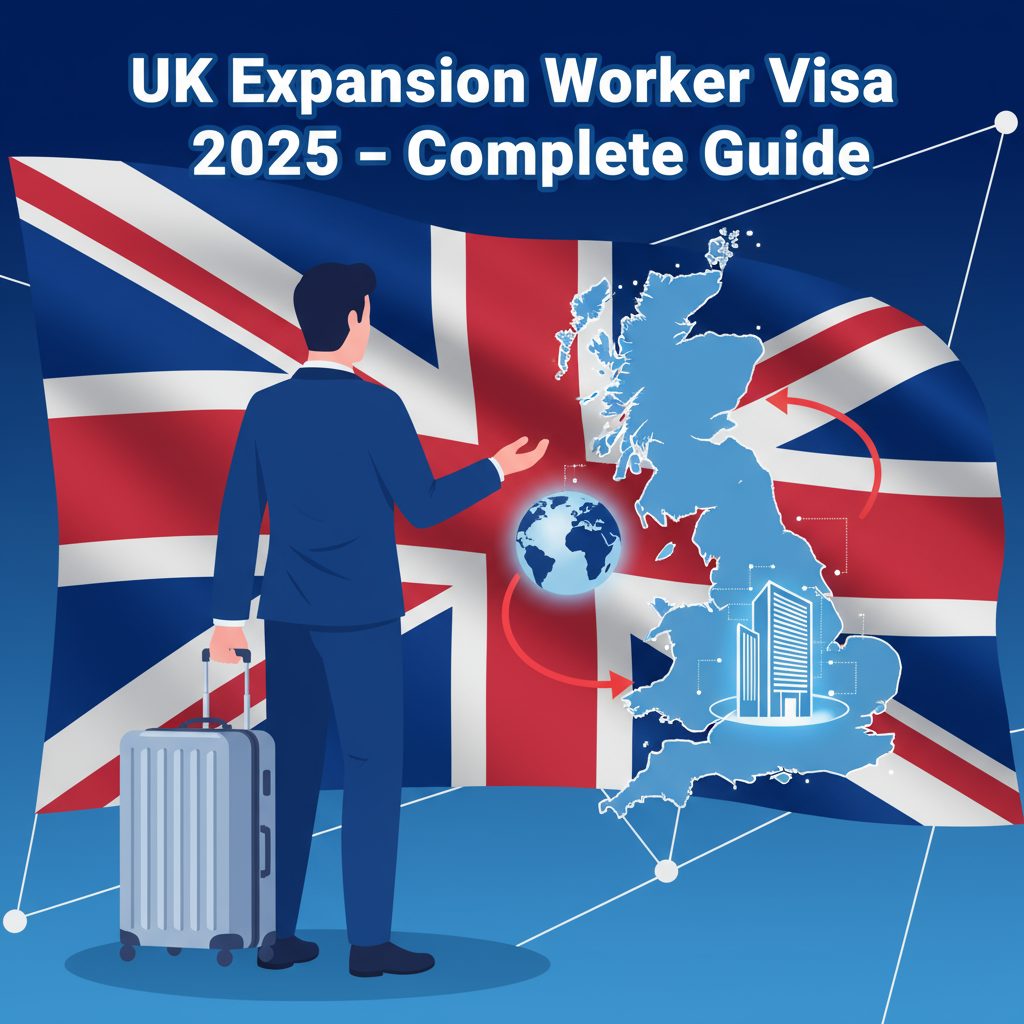The United Kingdom remains one of the most attractive destinations for global businesses seeking to establish or expand their operations. As international companies look to enter the UK market, the UK Expansion Worker Visa has become a vital route under the Global Business Mobility framework. This visa enables overseas organizations to send key employees—typically senior managers or specialists—to the UK to set up and grow their local presence.
In this comprehensive guide, you will learn everything about the UK Expansion Worker Visa, including its definition, eligibility, sponsorship requirements, financial obligations, and other key details that businesses and applicants must understand before applying.
What is a UK Expansion Worker Visa?

The UK Expansion Worker Visa is designed for overseas businesses that want to establish a branch, subsidiary, or affiliate in the UK. It allows experienced employees, such as senior executives or specialist workers, to temporarily relocate to the UK to help set up new operations. This visa is part of the Global Business Mobility Route, a set of immigration pathways that enable international companies to transfer employees for specific business purposes.
The visa allows the worker to stay in the UK for up to two years, giving them time to organize business operations, hire staff, and manage setup activities. Dependents, such as a spouse and children under 18, can also accompany the visa holder. However, the visa does not directly lead to permanent settlement (indefinite leave to remain), although time spent under this route counts toward the five-year cap for Global Business Mobility visas within a six-year period.
The UK remains one of the world’s top destinations for foreign direct investment, attracting over £2 trillion in investments by 2021. This makes the UK Expansion Worker Visa an important instrument for global enterprises that want to enter and operate in this highly competitive market.
Eligibility Requirements

To qualify for a UK Expansion Worker Visa, both the applicant and the employer must meet specific eligibility criteria set by the UK Visas and Immigration (UKVI).
Certificate of Sponsorship
Applicants must have a Certificate of Sponsorship (CoS) from a licensed sponsor. This document is an electronic record that provides details about the job role, salary, and other information confirming that the applicant is eligible for the visa. The employer must be an approved sponsor under the UKVI’s system to issue this certificate.
Employment Requirement
The applicant must be employed by the overseas business outside the UK for at least 12 months before applying. This requirement ensures that the individual has sufficient experience and a deep understanding of the business operations to effectively manage or establish the new branch in the UK.
There are exemptions to this rule for certain high-earning employees making £73,900 or more annually or for nationals of Australia or Japan, recognizing international trade agreements between these countries and the UK.
Salary Requirement
The applicant must earn a minimum salary of £45,800 per year or the “going rate” for the job, whichever is higher. The going rate refers to the standard salary for specific occupations according to the UKVI’s published codes. This ensures fair pay and prevents underpayment of foreign workers compared to local standards.
Also Read: What Is the Innovator Founder Visa
Financial Maintenance
Applicants must demonstrate that they can financially support themselves upon arriving in the UK. This typically requires having at least £1,270 in savings, held for at least 28 consecutive days before applying. Alternatively, the sponsoring employer can certify financial maintenance for the worker.
Skill Level Requirement
The job offered must meet the required skill level, typically RQF Level 6 or higher. This level is equivalent to a graduate-level role, ensuring that only skilled and experienced professionals are eligible for the visa. The role must also align with an approved occupation code under the UKVI guidelines.
Meeting all these requirements helps ensure that only genuine, qualified employees are transferred under this route to support the UK expansion of their parent companies.
Sponsorship Requirements
Employers play a crucial role in the visa process. To bring an employee to the UK under this route, the overseas business must secure a Sponsor Licence from UK Visas and Immigration. This license certifies that the company is legitimate, financially stable, and capable of fulfilling sponsorship duties.
To obtain a sponsor licence, the company must provide evidence of at least three years of active trading outside the UK. Once approved, the sponsor can issue Certificates of Sponsorship to eligible employees.
Sponsorship comes with significant responsibilities. Employers must comply with several requirements, including:
- Ensuring that the job meets the required salary and skill thresholds
- Keeping accurate records of sponsored employees, such as employment contracts and pay details
- Monitoring attendance and work performance of the sponsored employee
- Reporting any significant changes (resignations, salary adjustments, or job role changes) to UKVI within 20 working days
Since 2020, the number of businesses licensed to sponsor overseas workers has grown by more than 300%, demonstrating the increasing demand for international talent. Understanding and adhering to sponsorship obligations is essential to avoid penalties, licence revocation, or future application refusals.
Financial and Duration Requirements
The UK Expansion Worker Visa has specific financial and duration guidelines that applicants and employers must consider.
The minimum salary requirement is £45,800 per year or the role’s “going rate,” whichever is higher. Employers must ensure that salary structures comply with UK standards and that payment records are properly maintained.
Applicants must show that they can financially sustain themselves in the UK by proving access to at least £1,270 in personal savings unless their sponsor certifies this support. This financial proof helps ensure the worker won’t rely on public funds during their stay.
The visa allows individuals to stay in the UK for up to two years, but the total time spent under the Global Business Mobility routes cannot exceed five years within a six-year period. It is important to plan carefully, especially for businesses that may need to rotate staff between international offices.
Job Role and Occupation Requirements
The job role offered under the UK Expansion Worker Visa must align with one of the approved occupation codes listed by UKVI. These codes define eligible positions and their corresponding skill levels and salary requirements.
The typical requirement is an RQF Level 6 or higher qualification, which is equivalent to a graduate degree or a role requiring professional expertise. This ensures that only skilled professionals contribute to the UK branch’s development.
Certain positions listed on the Shortage Occupation List provide additional benefits, such as faster visa processing and reduced salary thresholds. This list includes job roles where there are skill shortages within the UK, making it easier for employers to hire overseas professionals to fill those gaps.
Applicants are generally required to have worked for their employer outside the UK for at least 12 months, but exemptions exist for those earning £73,900 or more annually. This flexibility allows companies to quickly mobilize top talent for critical expansion roles.
In 2023 alone, over 335,000 work visas were issued in the UK, reflecting the country’s growing reliance on global expertise to drive innovation, business development, and international collaboration.
Eligibility Summary for the UK Expansion Worker Visa
| Category | Requirement |
| Certificate of Sponsorship | Issued by a licensed UK sponsor |
| Employment History | At least 12 months with employer outside UK (exceptions for high earners) |
| Salary | £45,800 or the going rate, whichever is higher |
| Skill Level | RQF Level 6 or above |
| Financial Maintenance | £1,270 for 28 consecutive days unless certified by sponsor |
| Job Role | Must match UKVI-approved occupation codes |
| Sponsor Licence | Employer must have a valid licence with a three-year trading history |
| Maximum Stay | Up to 2 years (counts toward 5-year Global Business Mobility limit) |
| Dependents | Spouse and children under 18 can accompany applicant |
Business Plan and Permitted Activities
When applying for a Sponsor Licence, employers must submit a detailed business plan demonstrating their UK expansion strategy. This plan should outline:
- The company’s business model and expansion goals
- The rationale for setting up a UK branch
- Staffing and recruitment strategies
- Revenue projections and operational setup
A well-prepared business plan not only strengthens the visa application but also ensures that the business expansion aligns with UKVI’s requirements.
Once the visa is approved, workers are permitted to engage in a range of activities in the UK. They can:
- Work for their sponsoring employer in the specified role
- Study or attend professional training
- Volunteer for charitable organizations
- Travel outside the UK and return during the visa period
However, visa holders are restricted from accessing public funds, taking secondary employment, or applying directly for indefinite leave to remain under this route.
Conclusion
The UK Expansion Worker Visa serves as a vital mechanism for businesses looking to establish a foothold in one of the world’s largest economies. It enables international organizations to deploy key personnel to the UK to manage new operations, build teams, and facilitate cross-border collaboration.
By understanding the eligibility rules, sponsorship obligations, and financial requirements, businesses can streamline their visa applications and ensure compliance with UK immigration law.
Professional legal guidance from qualified immigration experts can help avoid errors, speed up the application process, and ensure a smooth transition for both employees and employers.
With the UK’s open approach to international investment and talent, the UK Expansion Worker Visa remains an essential route for global companies seeking long-term success in the British market.
FAQs
What is a UK Expansion Worker Visa?
The UK Expansion Worker Visa is part of the Global Business Mobility route that allows overseas companies to send senior managers or specialist employees to the UK to establish a new branch or subsidiary. It facilitates temporary relocation for business expansion purposes.
What is the salary requirement for the UK Expansion Worker Visa?
Applicants must earn at least £45,800 per year or meet the official “going rate” for their occupation, whichever is higher. This ensures fair pay according to UK industry standards.
How is the UK Expansion Worker Visa different from the Senior or Specialist Worker Visa?
The UK Expansion Worker Visa is intended for companies that do not yet have a presence in the UK, whereas the Senior or Specialist Worker Visa is for those transferring staff to an already established UK branch.
Do I need an immigration lawyer to apply?
While not mandatory, consulting a qualified immigration professional is highly recommended. It ensures accuracy, compliance, and a higher chance of success for complex business applications.
What is a sponsor licence?
A sponsor licence is authorization from UK Visas and Immigration that allows an overseas business to sponsor employees for work visas. It confirms the legitimacy of the employer and their capacity to meet visa obligations.
How long can I stay in the UK under this visa?
The visa allows a stay of up to two years. However, the total stay under Global Business Mobility routes cannot exceed five years in any six-year period.
How much does the UK Expansion Worker Visa cost?
The visa application fee is £298 per applicant. Additionally, applicants must pay the Immigration Health Surcharge, typically £1,035 per year, and provide proof of £1,270 in personal savings unless supported by their sponsor.
Can dependents accompany the visa holder?
Yes, dependents such as a spouse and children under 18 can accompany the applicant, provided they meet their individual visa and maintenance requirements.
I’m Debabrata Behera, a passionate blogger sharing insights, tips, and stories across diverse topics. Through my writing, I aim to inspire, inform, and connect with readers worldwide.

